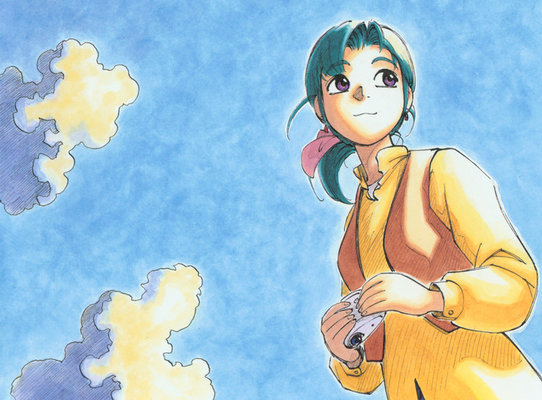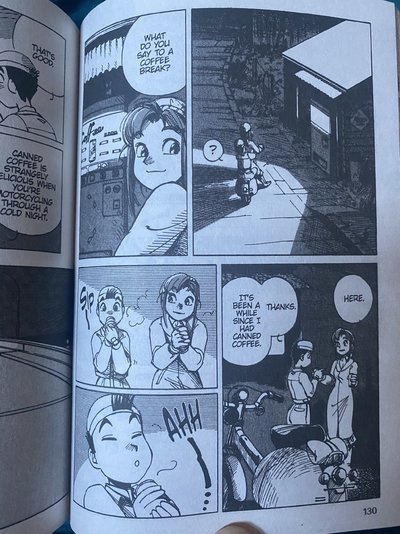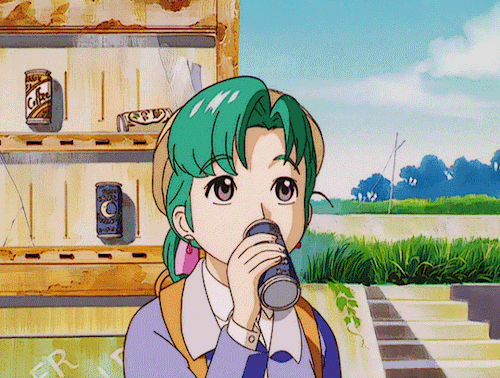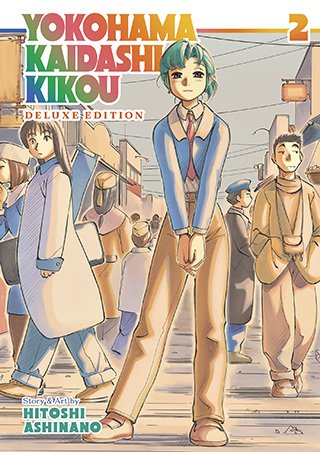ayase
State Alchemist

Since the first two-in-one volume is now available in English courtesy of Seven Seas (which appear to correspond to the Japanese re-release of 10 volumes rather than the original release of 14, meaning there will likely be 5 English volumes in total) now seems as good a time as any to talk about my very favourite manga, celebrate its English release nearly 20 years after the release of the final Japanese volume and offer my thoughts on this release. I hope I’m not stepping on any official AUKN review toes here, but I'd love to hear others' thoughts on the series too, whether old fans or new readers. Even if you don't like it (you're wrong, but your opinions are still appreciated).
First off, wowee, it finally happened against all the odds. An official release of a relatively obscure, now rather old manga by a similarly obscure mangaka which received two even lesser known short OVA adaptations which have never been released outside of Japan either. Someone at Seven Seas must have really believed in YKK, hopefully that belief will translate into sales. It certainly should, because it's wonderful, or at least I think it is.
YKK takes place in a far future setting which I would personally consider pretty utopian, your mileage may vary depending how much you like urbanism, large numbers of people and the fast pace of modern life. Me, not so much, so a world with a dwindling population and the cities underwater is rather an appealing one. But what sets YKK apart, perhaps even makes it unique among stories with future Earth settings is that it doesn't seek to make judgements about the people of their world's past or the situation of their present. It's not a utopian fantasy that imagines how the world could be better than it is now, nor is it a dystopian warning of how it could be worse. Life goes on in YKK's world without dwelling on what has happened in the past or fears for what the future may hold, two of humanity's most depressing and debilitating pastimes. It’s all an irrelevance to the sparse inhabitants of the future Miura peninsula as they go about their lives be they human, robot or otherwise.
As this first book begins with Alpha Hatsuseno’s titular shopping trip to Yokohama (leaving that untranslated was probably for the best in this age of overly literal titles, doubtless there would have been some disappointed shopaholic readers hoping to hear all about the delights of Yokohama's department stores) it feels almost like she’s been waiting for the reader to arrive to step out into the world and begin the story, much as she spends her days waiting for customers to converse with in her sleepy cafe. And as she meets new people, sees new sights and has new experiences both solitary and shared, it quickly becomes apparent that this is what YKK is really all about.
Mono no aware is concept of which I've become very fond, and I’ve seen on more than one occasion YKK listed as a prime example of it. While it’s often said that it’s a tricky concept to translate, I don’t think it is at all. It’s about appreciating things as they are at this moment, accepting the change that has and will inevitably come to everything and everyone, and being at peace with that. And it is a manga filled with appreciation for those precious moments in time. Slice-of-life manga more often than not is centred around the lives of children, probably because it is a time of life that enables people to be more carefree and truly live in the moment, whether they realise that at the time or not. But YKK imagines a world in which people retain that sense of childlike wonder at the world into adulthood, not quite in the hyperactive Yotsuba way (though this is in no way a slight against another slice-of-life great) but in a more thoughtful, introspective manner whether it's Alpha or Takahiro experiencing something for the first time, Oji-san and Sensei reminiscing about their youth or Ayase seeking out new things on his travels.
It's not a perfect world though, and there are hints that perhaps the world outside is not as friendly as the small community in which pretty much the entirity of YKK takes place. But hints are really all you're ever going to get, and first time readers hoping the many mysteries of YKK's world will ever be explained should probably dispel that idea right from the beginning. I get the distinct feeling they're there to be mysterious and make you wonder and imagine the possibilities, it would certainly be in-keeping with the manga's themes and feeding your own sense of wonder and imagination is probably more satisfying than any explanation could ever hope to be. The real draw is to spend time with these characters, in this specific place and time where they exist. A place of people, where time flows gently by.
After all that rambling, a few notes specific to Seven Seas' English release. The larger format, while appreciated, unfortunately suffers a little from either paper or print quality (or both) when compared to either Japanese release. While not a consistent problem throughout the book, I noticed certain pages in the English volume where darker areas are much too dark, obliterating any detail present in the original in a sea of solid black. This is not solely a problem with this book however, but it does make me wonder why English manga can't seem to manage to approach Japanese paper quality; Japan must surely produce enough of that nice paper for everyone, especially given how relatively cheap manga is over there compared to in the west.
As for the translation, I was mostly very happy with it. Fan translations like the one I've been used to (although I believe there are at least two) often tend to be more literal, but there appear to be very few differences here and if anything, I think it's possible Seven Seas' translation is the more literal of the two; ymmv on which you prefer. There are a couple of occasions where the fan translation appears to be the more flowery, notably Alpha's monologue about Yokohama and Kokone's letter to Alpha (mild spoiler: speaking of Kokone, I wonder how on Earth they're going to translate the "Koko, ne?" joke in a later volume: If memory serves the fan translation didn't even try and just explained it in the margin). The Kanagawa dialect many of the characters use has been handled slightly differently, although I don't think either can really be said to be any more accurate than the other and it's explained in the back of the book that the translator used the local dialect they're most familiar with, which is probably the best anyone can do (and while that's apparently Atlantic Canadian, it reads as uncannily Yorkshire which certainly made me smile). One minor gripe (and it is minor) is that I'm not a big fan of them translating "Misago" as "Osprey". It's debatable whether you can actually call it her name and that is the literal translation of the word, but the fact that みさご (Misago) is only two tiny strokes and one half-syllable away from みさこ (Misako) suggests to me it was supposed to sound like a name in Japanese, in a way "Osprey" really doesn't in English (apologies to anyone who happens to be named Osprey, but you probably wouldn't want your name translated into "Misago" in Japanese either, right? At least they didn't call her "Fish-hawk").
On a final positive note, I was happy to see this English release also includes the 4-koma from the cover flaps of the original volumes, which were not even included in the Japanese re-release. And on an extra positive note, this release exists in the first place so yeah, please buy it and read it and give the OVAs and Ashinano's other manga a chance of getting translated too.
Last edited:




